IOS lecture on “Building up an Inclusive Civilisation in India: Experiments in Good Governance and Human Rights by Muslim Rulers”
August 22, 2015 at 162, Jogabai, Jamia Nagar, New Delhi
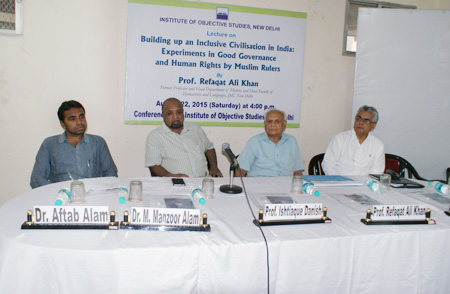
New Delhi, August 22: The Institute of Objective Studies organised a lecture on “Building up an Inclusive Civilisation in India: Experiments in Good Governance and Human Rights by Muslim Rulers” at its conference hall here today. Delivering the lecture, former Professor and Head of the Department of History and Dean Faculty of Humanities and Languages, JMI, New Delhi and the Vice-Chairman of the IOS, Prof. Refaqat Ali Khan insisted that the UN Universal Declaration of Human Rights, 1948, the UN International Covenant on Civil and Political Rights, 1966 and the recommendations of the UN Special Rapporteur, 1997 were, in principle already in practice in Islamic states nearly one and a half thousand years ago.
The sustained economic development under the Islamic empire that continued for several centuries indicated that the elements of peaceful co-existence and the recognition of and respect for others were far stronger than elements leading to social tensions. Explaining the interaction among the communities in the Abbasid empire, he said, Jews played a significant role. Jews, spread over the large empire, were a powerful religious community in the multi-religious, pluralistic society of West Asia. Jews were an empowered community, but other communities also enjoyed similar privileges. He observed that this was on account of a free social order under Muslim rulers. In India, Muslims were in a minority, but the rulers treated the non-Muslim majority in the same way as the non-Muslim minorities were treated under the Abbasid caliphate.
Prof. Khan pointed out that Jews in the USA and Parsis in India were small minorities, but they were empowered communities. In the medieval period, Jews under the Abbasid and the Parsis under the Mughals held great positions. In the ninth century, Indian trade became the foundation of international economy, contributing to a tremendous upsurge in internal commerce. Subsequently, the shift towards a unified bi-metallic currency system encompassed the eastern and Western caliphates. At this point, Jews took the lead in finance and trade. In Baghdad and Afghanistan, great financial and banking institutions arose with important and pivotal Jewish connection. Noted French author, Massingnon rightly observed that the corporate international finance today had obviously Jewish preponderance, he said, adding that the same was true of the Abbasid period.
The Jewish involvement in the US economy today had its parallel in the economy of the Abbasid period. Under the Abbasids, Jewish bankers entered the state fiscal system, including taxation and tax farming. Jewish bankers gained control of the Abbasid money in the market and became instrumental in the development of sophisticated financial techniques such as bill of exchange. He argued that with the fall of Baghdad, the economic centre shifted to Egypt and Europe. The Jews, too, lost their position of predominance, resulting in their migration to Central Asia and Europe in small numbers. They also lost their internal solidarity which was a source of their strength. He said that Jews did not find peace in the Christian West where they were persecuted. France expelled them in 1394, Spain in 1497 and England in 1528. They were also expelled from many cities of central Europe. He remarked that they did find peace in the Muslim East and the Ottoman Empire.
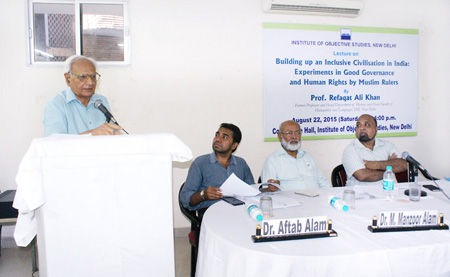
Prof. Khan explained that the Abbasid economic supremacy, to which India contributed, survived political fragmentation. The establishment of the Delhi Sultanate in India in the thirteenth century changed the economic and political map of the world. Delhi became another Baghdad. The Turkish victory leading to the establishment of the Delhi Sultanate, too, had impacted India’s economy and social life. According to him, the Delhi Sultanate did not bring about a social revolution in modern sense of the term. It created a new system of agrarian exploitation and urban growth. Moreover, it united political power with the economic power. The Delhi Sultanate did not interfere with public or private lives of the religious, ethnic or regional communities, nor did they interfere with the Muslim community.
But they certainly and effectively reduced the political and military power of traditional rural aristocracy. This resulted in corresponding fall in the status of Brahmins who were patronised by earlier rulers. This completely brought down the stable Brahminical social order in some areas. It was during the Sultanate period, much before the establishment of the Mughal empire, that a more enriched vibrant culture of peaceful co-existence and a more respectful interaction developed in larger parts of the country. The major contribution of the Bhakti-Sufi theism was the absorption of the marginalised communities in their fold. Muslim society in India was caste-free, but it had marginalised sections which got attracted to the Sufi-Bhakti movement. Sufism had a direct bearing on medieval thought in the same way as Bhakti had on Muslim thought.
Prof. Khan noted that the establishment of the Delhi Sultanate was certainly a turning point in India’s economic history as it spurred growth, which led to the emergence of an advanced and better society, though some historians believed otherwise. He observed that the foundation of an inclusive civilisation was as old as Indian culture and its way of life. The advent of Islam in India gave added richness to it. In spite of caste identities, inclusiveness existed through several centuries. Though Muslims had a separate identity, they were part of that inclusiveness. Mixed army and mixed bureaucracy could be cited as a typical example of this inclusive civilisation. He argued that public discussion and public reasoning had a long history in India which began with the Buddhist Councils at Rajagriha, Vaishali, Kashmir and Patliputra. Ashok and Akbar inherited the spirit of public speaking and reasoning as a part of social communion in India with the toleration of intellectual heterodoxy.
Prof. Khan held that the United Nation Universal Declaration of Human Rights, 1948 might be a European innovation, but in India we found them in practice in the sixteenth century. The provisions of the UDHR had been compared with the rules and regulations of Akbar. At many places even the terminology was the same. These included discussions on women’s rights, right to life, freedom from slavery or servitude, equality before law, protection of individual’s privacy, freedom of movement, right of an adult man and a woman to marry and found a family, right to own property, right to equal access in public services, right to work and free choice of employment, and the right to participate in the cultural life of the community and freedom of thought, conscience and religion. He said that compulsions in political life during the Mughal rule were much the same as in modern times. He also examined the Mughal administration in the context of the Aam Admi, Jan Lokpal, action against corruption and the problems of coalition politics. He concluded the lecture by quoting the Nobel Laureate Amartya Sen, who noted, “Secular India was not Akbar’s innovation. Its strength was in the secular traditions of India and Islamic percept of toleration.” He also quoted Prof. Z M Khan who expressed confidence that Indian pluralism would survive in spite of the current rise of virulent Hindutva.
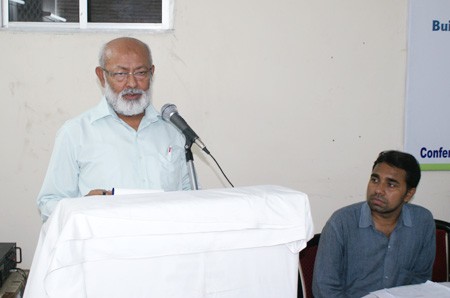
The Chairman of IOS Dr Mohammad Manzoor Alam wanted to know the reason why those living in the hills and jungles embraced Christianity instead of Islam. On the other hand, several communities in the plains embraced Islam. This, he said, might be due to the geographical location of different communities. He pleaded for the translation of history books from English, Persian and Urdu to Hindi in order to reach a large population, particularly in the north, so that misconceptions about Islam and Muslims could be dispelled. He stressed that booklets on various topics should be produced and made available to the people. He informed that the IOS had decided to get lectures organised by it translated into Urdu. Commenting on Prof. Khan’s lecture, he said that it assumed importance as the language used during the lecture was both English and Urdu.
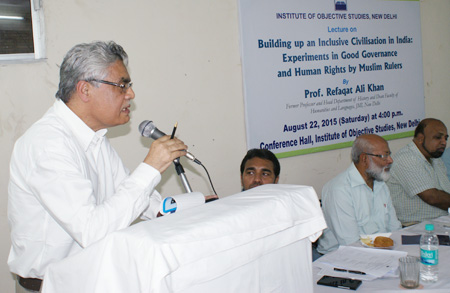
In his expert comments, former Adviser, Ministry External Affairs, Government of India, Dr. Shabi Ahmad hailed the lecture as an attempt to encapsulate merely a thousand years of Muslim ruled in India. He said that the lecture touched upon almost all aspects of the period under review. He held that the partisan view of some historians had been demolished by the lecture.
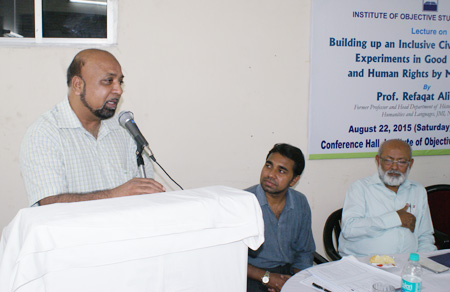
Associate Prof. of Islamic Studies, Jamia Hamdard, Prof. Ishtiyaque Danish presided over the function, Dr Aftab Alam, Asstt. Prof. of Political Science, Zakir Husain College conducted the proceedings. The lecture began with the recitation of the Quran by Hafiz Athar Husain Nadvi. Those who attended the lecture included Prof of History, JMI, Prof Rizwan Qaiser, Shafiq ur Rahman, Dr. Tariq Ashraf, Dr Rafiullah Azmi, SM Bashir, Pervez Bilgrami, Aftab Ahmed, Dr Mohammad Qasim, S Hajrah, Dr Onkar Mittal, Col. AR Khan, Mohammad Mehfooz, Mohammad Ilyas, Shamshad Ikram, Mohd. Kazim Sher advocate, Iqbal Husain, Kaneez Fatima, Haleema Sadia, Humairah Rasool Dehlvi, Safi Akhtar and Waseem Fahmi.
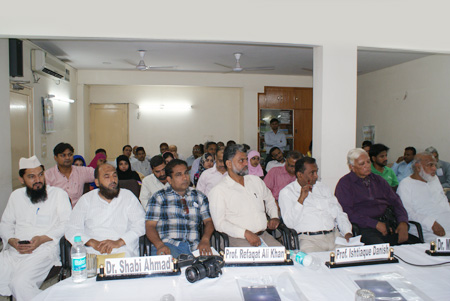
(Please read complete text of the lecture)
Go Back